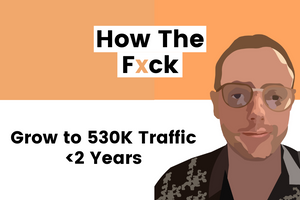In this talk with Nick Jordan of Content Distribution, we take a look at how he scales content production to help companies quickly dominate search engines.
This week, I interview Nick Jordan, the Founder of ContentDistribution.
Content Distribution is a content creation and distribution agency who're also the creators of ClusterAI, an incredibly useful keyword research automation tool.
The team's successes talk for themselves, as they've grown the organic reach of these brands rapidly:
✔️ 0 to 47,000 organics/month in 13 months for AnyLeads.com
✔️ 0 to 103,000 organics/month in 13 months for LogicInbound.com
✔️ 0 to 116,000 organics/month in 13 months for Doggypedia.org
✔️ 0 to 166,000 organics/month in 13 months for CampusReel.org
✔️ 0 to 479,000 organics/month in 16 months for DoNotPay.com
This is what we focus on in the video below. It's a pretty interactive interview, as Nick shows us all his secrets via Zoom screen share!
It's definitely a must-watch for anyone wanting to rapidly scale their organic traffic, hire quality freelancers and build a revenue generating content program.
Enjoy!
On this page:
- Quick Q&A with Nick (best bits from the recording)
- The timestamps so you can skip ahead
Subscribe below to access members only content like timestamps and extra analyses.
Mini-Q&A
What's the high-level overview of your marketing success story?
I've grown 4 projects from 0 to 100k/organics/month. The fastest hit 100k/month in 8 months, the largest hit 530,000/organics/month in month 17.
What steps led to your success?
- Every page of content published should be higher quality and more relevant than any other page Google could show for the keywords you want to rank for (higher quality can be measured by user engagement metrics)
- Document everything and automate everything—your processes define your success
- Build an in-house content team
- Scale content production—production velocity is the secret to scaling organic traffic
What's your must-follow tip for anyone wanting to copy this strategy?
The absolute best metric to evaluate whether one page adds more value to a reader than another page is NOT backlinks.
It's user engagement metrics, for example CTR, bounce rate, time on site, pages visited, repeat visits, overall site engagement, termination of search, etc.
It would be a huge oversight if, Google, the world's most innovative big data company, the guys that make $100B from search, and the owner of Analytics, Chrome and Android wasn't using this data to influence search results
Episode timestamps:
00:00: Brief summary and intro to the podcast
01:40: What are the key components? What's your strategy?
02:55: How do you design a piece of content that keeps people engaged? How do you scale content creation without expert writers?
05:00: What's the first place you start with a new client, who's at 0 organic search?
15:28: How to calculate return on investment for SEO research
17:49: How to overcome publishing velocity
28:00: How to structure a freelance brief- It's worth doing a lot of upfront work and talking a freelancer thoroughly through it. But, especially when you want a freelancer to do 50 articles.
30:40: SEO is the easiest to get an evergreen audience again and again and again
37:40: Who disagrees with this? What's the opposite point of view?
38:30: The vanity metric trap, does any of this convert?


